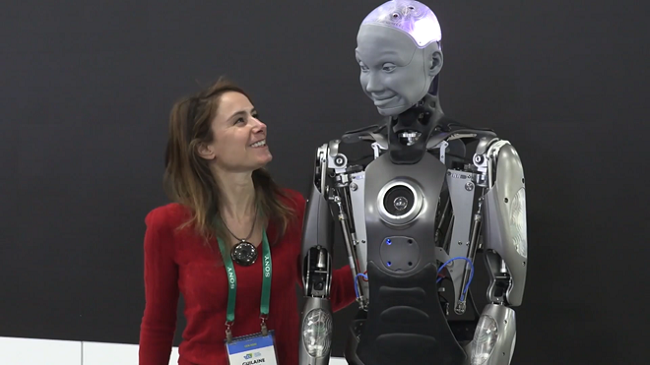
Introduction
Artificial general intelligence (AGI) is an area of AI research aimed at creating machines that are capable of general cognitive abilities comparable to those of humans. Whereas AI research is focused on creating narrow or specialized abilities in machines (playing Go, recognizing objects in an image), AGI research is aimed at developing a single man-made mind that can perform a wide range of tasks that currently require human intelligence, such as understanding natural language, abstract reasoning, and common sense. The topic of consciousness is often brought up in relation to AGI, as it is not clear whether a machine with human-level cognitive abilities could also be conscious in the same way humans are, but for the sake of simplicity this article will define the most rudimentary kind of AGI (an artificial mind that has not yet recursively improved itself) as an agent who acts rationally, in contrast to agents that think rationally, think like a human, or act like a human (see Stuart Russel’s introduction to AI). This definition lets us sidestep the thorny question of consciousness and focus on the possible implications of creating artificial minds that can act rationally and shape the world that we live in. We would like to argue that AGI has the potential to improve our lives in a number of ways, and that we should be working on developing it as soon as possible. The first way in which AGI could improve our lives is that it could do the work that us humans consider dull, dirty, or dangerous, this would allow us to use our precious time for more rewarding or enjoyable activities. For example, imagine a world where autonomous AGI robots could clear out a hazardous waste zone instead of human workers having to do it, or a world where all the cleaning and housework is done by machines.This would free up a lot of human time and energy that could be put to use doing more interesting or productive things. Furthermore, AGI could also benefit us by solving our biggest and most complex problems. For example, if we could create an AGI that is able to accurately model the complexities of the world and human behavior, it could be used to create better policies and plans that would help us solve global problems such as climate change, poverty, and disagreements. Additionally, AGI could help us solve problems in healthcare.. A final use case that excites us about AGI is the possibility of applying it to space exploration and the colonization of distant worlds. This use case is a very existential one, and although it is science-fiction at this point, we see it as a possibility.
AGI will help save human lives in dangerous situations and give humans more free time to enjoy their lives

First of all, AGI could do dangerous and dull work. AGI would be capable of taking over tasks from humans which requires certain human-like cognitive abilities, such as decision making and making contact with humans. For example, AGI could be helpful with saving people out of hazard zones after a natural disaster. Additionally, AGI would be way faster at tracking down humans who are for example stuck under debris, maximizing the chance of survival for many. AGI can even give us a signal when a natural disaster is about to happen far before we know, which will lessen the damage even more. Second, AGI would be able to take over the boring or repetitive tasks humans nowadays perform in their jobs. This would grant people more time to spend with their families, loved ones and communities. According to numerous schools of thought, as well as growing studies on happiness, one of the most significant drivers of our personal happiness is our connections with others (together with good health). If AGI can be utilized to give humans more free time, we may be able to focus less on material demands and more on assisting and spending valuable time with others around us, including not just our friends and family but also our communities. We may expect a healthier and more egalitarian society if we encourage this type of human engagement. Additionally, people will be able to invest more in improving their lives after AGI reduces economic stress and optimizes efficiency. Employers might provide each employee with the option for self-development, giving them the choice to select how they wish to grow. Stipends might be made available to all college students, allowing them to study without feeling pressured. Along with investments in people, more wealth would be available to spend in well-being-related research and development, as well as the social sciences, potentially leading to a society that is not just technologically sophisticated, but also culturally evolved and happy.
AGI will solve societal issues

Secondly, AGI could help us find new and innovative solutions to complex problems. AI might aid in the better analysis of the long-term repercussions of proposed public policies, allowing voters to make educated decisions and perhaps vote directly on the most critical topics. Fact-based discourses would be catalyzed by political parties, think tanks, and civil society groups, and media reporting may become considerably more fact-based. All of these parties would compete to see who could use AI most effectively to improve overall societal well-being and individual liberty. The key aim for future AI regulation in democratic liberal nations should be to ensure that individual freedom and autonomy are not harmed by particular AI deployments. However, we must be mindful of the potential for AI to be misused for different forms of deception, and we must put in place procedures to avoid such. François Chollet, an AI researcher, has provided an example. Chollet believes that an authority, such as a government, may use machine learning to influence people’s beliefs by promoting or suppressing an individual’s voice merely by exposing them to audiences with similar or opposing opinions, resulting in a sense of affirmation or rejection. Such tendencies would be troubling even if there were no apparent negative intents, and as Chollet points out, we must become the controllers of AI algorithms rather than the servants. This is where AGI might possibly assist, given the technology is not monopolized by a few stakeholders and is made available to the general public, offering them greater tools for information analysis and filtering, as well as the capacity to defend themselves from harmful practices. By the same token, AI and associated technologies are becoming more common in business and society, and they’re starting to show up in healthcare. Many elements of patient care, as well as administrative operations within clinicians, payers, and pharmaceutical companies, might be transformed by these technologies. A number of studies have already shown that AI can perform as well as or better than humans in crucial healthcare activities like illness diagnosis. Algorithms are already surpassing radiologists in terms of detecting dangerous tumors and advising researchers on how to build cohorts for expensive clinical trials. Imagine what AGI could mean in terms of taking workload off healthcare personnel, especially with crises like COVID-19, which will probably not be the last time such a worldwide disaster occurs. Last but not least, AGI might help us solve climate change. AI researchers cannot make meaningful progress in real-world areas without expert collaboration. To solve complicated challenges at the heart of society’s most pressing demands, cooperation across disciplines are required to identify the best ways ahead in these sectors. It’s why imagining what a world with AGI would look like with a diverse group of scientific and social experts is so vital. Addressing global concerns like climate change while we create AGI would not only have favorable effects that are urgent and required for our planet, but will also advance the science of AGI. Many additional AGI challenges remain unsolved, ranging from causality to learning efficiency, and as algorithms get more broad, more real-world problems will be addressed, resulting in a system that is steadily becoming more intelligent and will one day help solve all other complex problems too.
AGI might prevent the extinction of humankind in the distant future

Our third argument might make you think: ‘Oh, but that’s not my problem’, and you’re probably right as it’s an issue for the very distant future, but let’s face it: our time on Earth is limited. We know that in about 7 billion years, the sun’s expansion will swallow our world whole, and leave nothing behind. Our planet will become uninhabitable sooner than that, in the order of a billion years. Sooner or later, we will have to leave our pale blue dot behind, and find a new place to call home. This is necessary if humanity wants to survive and one day become a galactic civilization.
Difficulties arise when you take into consideration the astronomical distances between stars (our nearest neighbor, Proxima Centauri, is about 4.2 light-years away) and the speed of our current spacecraft. Researchers from MIT point out that with current technology, it would take us 6,300 years to reach Proxima b, a candidate exoplanet in the neighboring system. Space is so foreign to us, and resources are non-existent, so much so that in this review, the researchers discuss how much inbreeding can be allowed in order to make sure that a crew would reach Proxima b, while minimizing the size of the crew. Their advanced simulation algorithm Heritage predicts that 98 settlers are needed to guarantee that a healthy crew will reach Proxima b.
The trip is simply too long and too challenging, and even with 98 crew members, it is arguably an impossible feat to get there with today’s technology. This is where von Neumann probes come in.
A von Neumann probe is the combination of a self-replicating machine (one that harnesses the necessary resources and uses them to make copies of itself) and a probe (an instrument to explore or examine something). The term was coined by the Hungarian mathematician John von Neumann. The construct consists of a probe (the various instruments that let it explore its surroundings), life-support systems that will maintain and repair the construct, a factory which harvests resources and replicates itself, memory banks that store information and knowledge, and a motor to propel it through space. One of the applications of an AGI operated von Neumann probe would be deep space exploration and travel. Instead of risking the lives and sanity of many generations in space travel that would take millenia, thousands of AGI von Neumann probes could be given traces of human DNA conserved cryogenically and then launched into space. The AGI could then start looking for an inhabitable exoplanet, create human embryos from the genetic material, and nurse them and educate them into adulthood just in time for their arrival to their new world.
There are other variations of von Neumann probes that do not intend to transport humans to distant planets but instead have the goal of terraforming them and seeding the prospective colonies with infrastructure and cities. The idea of von Neumann probes might seem distant and far-fetched, but there is real research going on about very concrete aspects of it such as their engineering and the types of materials they could harvest and use.
The reason we believe that AGI is necessary for the creation of von Neumann probes that are effective is that narrow AI would not be able to deal with the unknown and maybe even unimaginable conditions of deep space. An AGI would be able to use its common sense, planning, decision making, and recursive self-improvement skills to reach its goal of colonizing distant worlds. The possibilities are just endless.
Why AGI is not a threat to humankind
“I strongly believe that given the technologies we are now developing, within a century or two at most, our species will disappear. I don’t think that in the end of the 22nd century, the Earth will still be dominated by Homo sapiens.”
– Yuval Noah Harari
An often named counterargument for the research on and implementation of AGI is that it is unethical, because it could become a threat to humanity if it has bad intentions and it will, according to great thinkers like Yuval Noah Harari, be humankind’s last invention. We refute this argument, as an AI is unable to wish to accomplish anything, let alone operate against humanity’s interests and rebel against human authority, until it has feelings or consciousness. Any type of autonomous action needs the will to act. And the moment an AI desires anything, it will exist in a society with rewards and punishments, including punishments for bad behavior. To exist in a society controlled by humans, AGI will need to develop a human-like moral sense of what is good and what is wrong. It will realize that performing unethical behaviour is ethically incorrect by the time it is in a position to consider it.
Conclusion
To summarize, AGI will help save human lives in dangerous situations and give humans more free time to enjoy their lives. Furthermore, AGI can solve societal problems such as political issues and challenges in healthcare, such as staff shortage as well as diagnosing illnesses in an early stage. Finally, AGI might prevent the extinction of humankind in the distant future. Machine learning’s progress on restricted tasks has diverted our attention away from the most important aim of artificial general intelligence. We’ve become accustomed to construing every problem in this way since machine learning is meant to address categorization problems and does so well. We seldom explore problems of a different kind: ones that need a broad range of thinking abilities; this may be because AGI seems a threat to humankind for most people. It may be a bummer to learn that we’re still very early on the road to real AGI, and that attaining it is likely a long way off, about 70 years after the charter was established for AI. But there’s good news as well: according to scientists, there’s value in the trip to AGI, and there’s a lot of untapped potential in the AI systems that are starting to show some early signs of intelligence. In conclusion, AGI will save humanity and must therefore get the highest priority when it comes to research and development.


